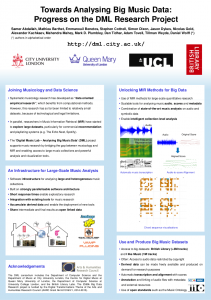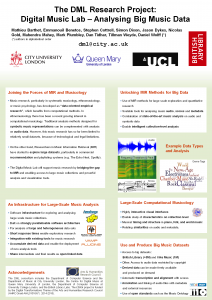The DML project was presented at the event sponsored by the Audio Engineering Society, entitled “Cutting Edge Research – from City University and King’s College London”, which took place at City University on 14th October.
The event showcased cutting edge research from City University’s Music Informatics Research group and King’s College London’s Centre for Telecommunications Research. As part of the event, Tillman Weyde gave a talk on the group’s activities (including the DML project), and Dr Dan Tidhar presented the poster entitled “Big Data for Musicology and Music Retrieval”.


